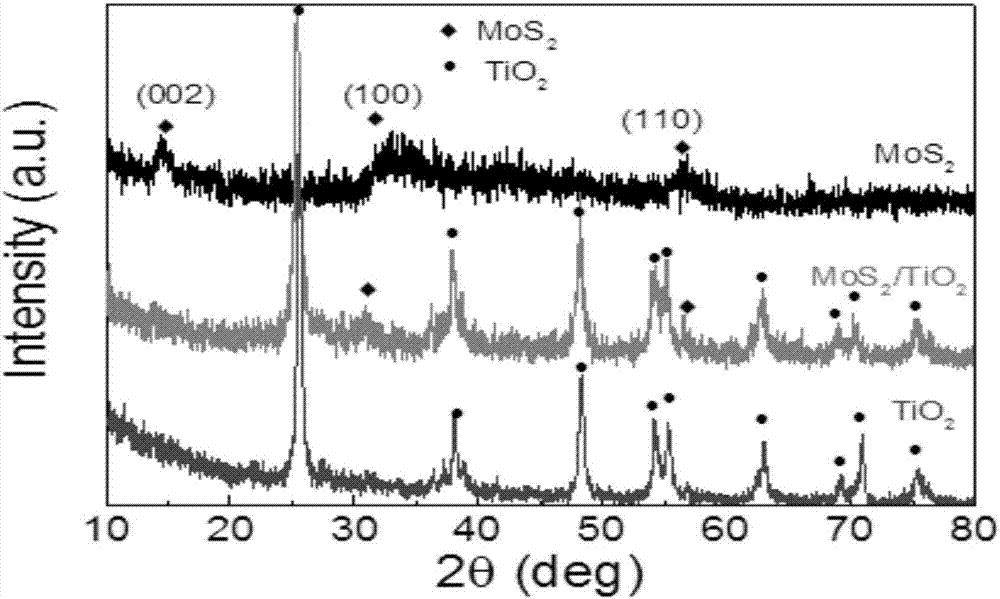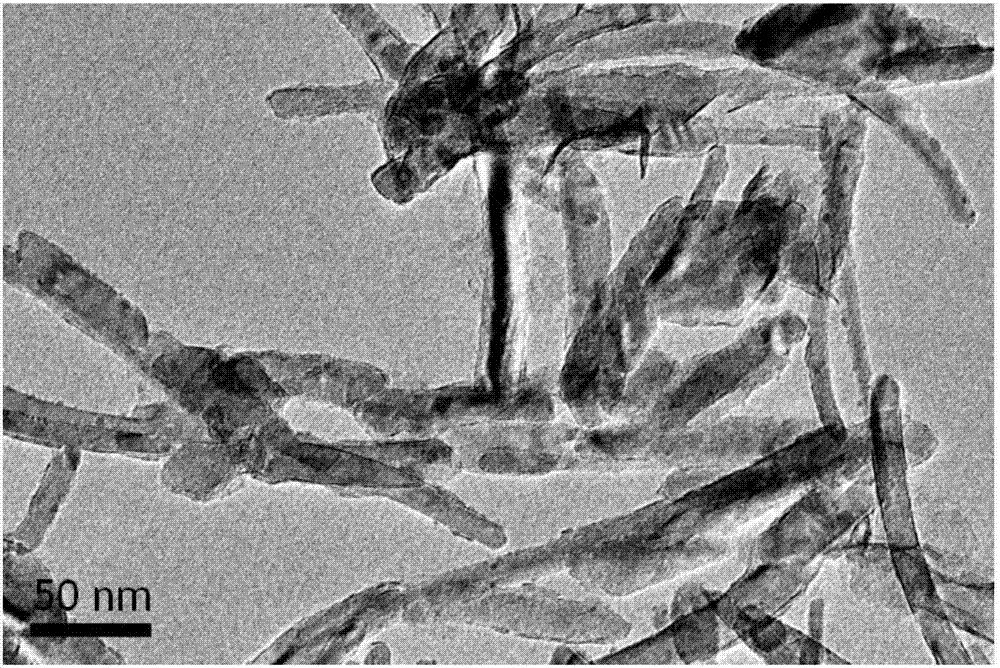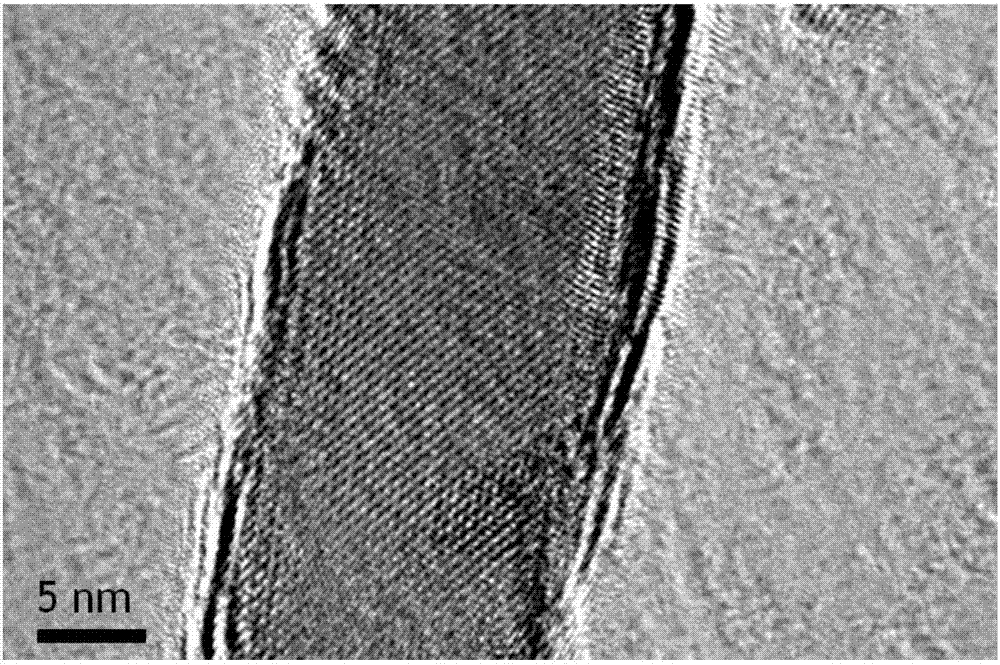A kind of monolayer molybdenum disulfide/ultrafine titania nanobelt heterostructure photocatalyst and its preparation method
A technology of ultra-fine titanium dioxide and single-layer molybdenum disulfide, applied in the direction of physical/chemical process catalysts, chemical instruments and methods, chemical/physical processes, etc., can solve the problems of difficult recovery and separation, less exposure of high catalytic active surfaces, and utilization of sunlight Low efficiency and other problems, to achieve the effect of good hydrogen production performance, good catalytic performance, good degradation effect
- Summary
- Abstract
- Description
- Claims
- Application Information
AI Technical Summary
Problems solved by technology
Method used
Image
Examples
Embodiment 1
[0025] ① In terms of volume ratio, prepare a mixed organic solvent according to the ratio of N,N-dimethylformamide: glacial acetic acid (DMF: HAc) = 6:4, the mixed organic solvent, LiAc·2H 2 O, tetrabutyl titanate mixed organic solvent by 10L, 200g LiAc 2H 2 O, the proportion of 2L tetrabutyl titanate is added to the hydrothermal reaction kettle in turn, the filling degree is controlled at 50% to 80% of the reaction kettle volume, and the stirring is even; then the hydrothermal reaction kettle is sealed and put into a dry In the box, control the hydrothermal temperature at 200±10°C, react for 20 hours, and naturally cool to room temperature after the reaction. The product obtained is washed repeatedly with absolute ethanol until it is neutral, then suction filtered and dried. The obtained white powder is ultrafine Titanium dioxide nanoribbons;
[0026]②Take the ultrafine titanium dioxide nanoribbon powder prepared in step ① and disperse it in water, stir it ultrasonically for...
Embodiment 2
[0033] ① In terms of volume ratio, prepare a mixed organic solvent according to the ratio of N,N-dimethylformamide: glacial acetic acid (DMF: HAc) = 6:4, the mixed organic solvent, LiAc·2H 2 O, tetrabutyl titanate mixed organic solvent by 10L, 200g LiAc 2H 2 O, the proportion of 2L tetrabutyl titanate is added to the hydrothermal reaction kettle in turn, the filling degree is controlled at 60% to 80% of the reaction kettle volume, and the stirring is even; then the hydrothermal reaction kettle is sealed and put into a dry In the box, control the hydrothermal temperature at 200±10°C, react for 16 hours, and naturally cool to room temperature after the reaction. The product obtained is washed repeatedly with absolute ethanol until it is neutral, then suction filtered and dried. The obtained white powder is ultrafine Titanium dioxide nanoribbons;
[0034] ② Disperse the ultrafine titanium dioxide nanoribbon powder prepared in step ① in water, and stir it ultrasonically for 30±5m...
Embodiment 3
[0038] ① In terms of volume ratio, prepare a mixed organic solvent according to the ratio of N,N-dimethylformamide: glacial acetic acid (DMF: HAc) = 6:4, the mixed organic solvent, LiAc·2H 2 O, tetrabutyl titanate mixed organic solvent by 10L, 200g LiAc 2H 2 O, the proportion of 2L tetrabutyl titanate is added to the hydrothermal reaction kettle in sequence, the filling degree is controlled at 60% to 70% of the reaction kettle volume, and the stirring is even; then the hydrothermal reaction kettle is sealed and put into a dry In the box, control the hydrothermal temperature at 200±10°C, react for 24 hours, and naturally cool to room temperature after the reaction. The product obtained is washed repeatedly with absolute ethanol until it is neutral, then suction filtered and dried. The obtained white powder is ultrafine Titanium dioxide nanoribbons;
[0039] ②Take the ultrafine titanium dioxide nanoribbon powder prepared in step ① and disperse it in water, stir it ultrasonicall...
PUM
| Property | Measurement | Unit |
|---|---|---|
| size | aaaaa | aaaaa |
| thickness | aaaaa | aaaaa |
| size | aaaaa | aaaaa |
Abstract
Description
Claims
Application Information
 Login to View More
Login to View More - R&D
- Intellectual Property
- Life Sciences
- Materials
- Tech Scout
- Unparalleled Data Quality
- Higher Quality Content
- 60% Fewer Hallucinations
Browse by: Latest US Patents, China's latest patents, Technical Efficacy Thesaurus, Application Domain, Technology Topic, Popular Technical Reports.
© 2025 PatSnap. All rights reserved.Legal|Privacy policy|Modern Slavery Act Transparency Statement|Sitemap|About US| Contact US: help@patsnap.com



